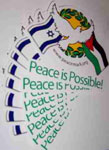A group of Muslim, Christian and Jewish leaders, making up the National Interreligious Leadership Initiative for peace in the Middle East, are calling for a renewed effort to restart the dormant peace process between Palestinians and Israelis. Bishop Mark S. Hanson of the ELCA is among the leaders. See ELCA news release.
Here is their recent statement:
Twilight of Hope for Israeli-Palestinian Peace
January 2013
Twilight has fallen on the possibility of a two-state solution to the Israeli-Palestinian conflict. As Jewish, Christian and Muslim religious leaders committed to peace, we urge immediate, sustained U.S. leadership before darkness falls on the hopes for a peaceful resolution.
We recently witnessed shadows of dusk. We mourn for the lives lost and shattered during the violence that gripped southern Israel and Gaza. What we have seen, recently and before, will keep happening if movement towards a viable two state-solution continues to stagnate. The status quo is unsustainable and dangerous to both Israelis and Palestinians. Now is not the time for another cycle of recriminations. It is time to break the cycle of violence with bold initiatives for peace.
The current dangerous stalemate, including the legacy of past failed peacemaking efforts, undermines our security and that of others, destabilizes the region, fuels terrorism and extremism, allows continuing Israeli settlement expansion, and prolongs Palestinian disunity. These realities and the absence of negotiations threaten to kill the prospect of a viable two-state peace agreement, the only realistic solution to the conflict.
As people of faith, we proclaim that we should never underestimate what is possible. Egypt and the United States helped achieve a ceasefire in Gaza. With the support of the international community, Israelis and Palestinians can achieve a lasting peace. A new dawn is possible.
As members of the National Interreligious Leadership Initiative for Peace in the Middle East (NILI), we affirm President Obama’s support for a negotiated two-state peace agreement that provides for a secure and recognized Israel living in peace alongside a viable and independent Palestinian state.
We know the challenges are daunting, but we believe a bold new initiative for an Israeli-Palestinian peace settlement should be an immediate priority of the new Administration in 2013. We fear the opportunity for a peaceful resolution is rapidly waning and the current stagnation encourages the rejectionists on both sides. Our nation has unique leverage and credibility in the region. Indeed, no past progress towards peace has occurred in this conflict without U.S. leadership, facilitation or staunch support. Once again, we need active, fair and firm U.S. leadership to help break the current deadlock and to achieve a two-state peace agreement now before it is too late.
The Jewish, Christian and Muslim religious leaders of NILI are committed to mobilizing broad public support for U.S. leadership for peace. We will mobilize the strong support that exists in churches, synagogues and mosques across the country.
Twilight is upon us; but the hope for a new dawn remains. Let us together bring the new light of hope and work for negotiations leading to a final status agreement.
List of Endorsers (Organizations for identification only)
Christian Leaders:
Bishop Richard E. Pates, D.D., Chairman, USCCB Committee on International Justice and Peace
Theodore Cardinal McCarrick, Archbishop Emeritus of Washington
Bishop Denis J. Madden, Auxiliary Bishop of Baltimore
Archbishop Vicken Aykasian, Director, Ecumenical Affairs, Armenian Orthodox Church in America
Fr. Mark Arey, Director, Office of Ecumenical Affairs, Greek Orthodox Archdiocese of America
Kathryn Mary Lohre, President, National Council of Churches of Christ USA
Bishop Mark S. Hanson, Presiding Bishop, Evangelical Lutheran Church in America
Most Rev. Dr. Katharine Jefferts Schori, Presiding Bishop and Primate, Episcopal Church
Reverend Gradye Parsons, Stated Clerk, Presbyterian Church (USA)
Reverend Geoffrey Black, General Minister & President, United Church of Christ
Reverend Dr. Sharon Watkins, General Minister, President, Christian Churches (Disciples of Christ)
Bishop Bishop Mary Ann Swenson, Council of Bishops, United Methodist Church
Richard Stearns, President, World Vision US
Reverend Leighton Ford, President, Leighton Ford Ministries, Board Member, World Vision US
David Neff, Editorial Vice-President, Christianity Today
John Buchanan, Editor/Publisher, The Christian Century
Jewish Leaders:
Rabbi David Saperstein, Director, Religious Action Center of Reform Judaism
Rabbi Peter Knobel, Past President, Central Conference of American Rabbis
Rabbi Elliot Dorff, Ph.D. Rector and Distinguished Professor of Philosophy, American Jewish University
Rabbi Burt Visotzky
Rabbi Amy Small, Past President, Reconstructionist Rabbinical Association
Rabbi Paul Menitoff, Executive Vice President Emeritus, Central Conference of American Rabbis
Muslim Leaders:
Imam Mohammed Magid, President, Islamic Society of North America
Dr. Sayyid Muhammad Syeed, National Director, Islamic Society of North America
Naeem Baig, Executive Director, Islamic Circle of North America
Imam Feisal Abdul Rauf, Founder of the ASMA Society and the Cordoba Initiative
Imam Yahya Hendi, Muslim Chaplain, Georgetown University
Dawud Assad, President Emeritus, Council of Mosques, USA
Eide Alawan, Interfaith Office for Outreach, Islamic Center of America
Iftekhar A. Hai, Founding Director, United Muslims of America Interfaith Alliance
 In a letter to Secretary of State John Kerry this week, thirty key Jewish, Christian and Muslim religious leaders “voiced strong support for his determined initiative for Israeli-Palestinian peace.” In similar letters, the leaders called on key members of Congress “to support Secretary Kerry’s continuing urgent efforts for peace.”
In a letter to Secretary of State John Kerry this week, thirty key Jewish, Christian and Muslim religious leaders “voiced strong support for his determined initiative for Israeli-Palestinian peace.” In similar letters, the leaders called on key members of Congress “to support Secretary Kerry’s continuing urgent efforts for peace.”